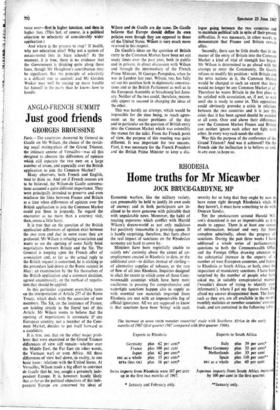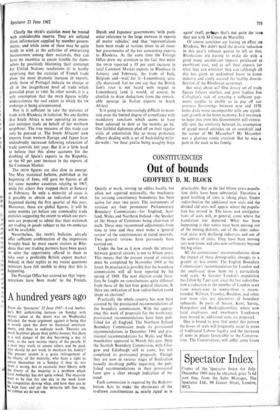Home truths for Mr Micawber
RHODESIA JOCK BRUCE-GARDYNE, MP
Economic warfare, like the military variety, can presumably be held, to justify its own code of secrecy; and in both participants are in- clined to be more generous with palatable than with unpalatable news. Moreover, the habit of treating exposures which conflict with Harold Wilson's dream-world as not only malicious but positively treasonable is growing apace. It is hardly surprising, therefore, that facts about the real impact of sanctions on the Rhodesian economy are hard to come by.
Ministers have been regretfully unable to satisfy MP5' curiosity about the extent of un- employment created in Rhodesia to date, or the additional cost—in dollars instead of sterling— of alternative supplies of tobacco, or the rate of flow of oil into Rhodesia. Inquiries designed to elicit the extent to which some of those Com- monwealth countries which have been most vociferous in pressing for comprehensive and watertight sanctions happen also to supply us with essential raw materials imported from Rhodesia are met with an impenetrable fog of official ignorance. All we are supposed to know is that sanctions have been 'biting' with such severity for so long that they ought by now to have eaten right through Rhodesia's vitals. If they haven't, it must have something to do with Duncan Sandys.
Yet the smokescreen around Harold Wil- son's dreamland is not as impenetrable as it is made to appear. There is at least one source of information, belated and very far from complete admittedly, about the progress of sanctions. During the past three weeks I hale addressed a whole series of parliamentary questions to both the Commonwealth Office and the Foreign Office drawing attention to the substantial increase in the exports of a number of west European countries, and Japan, to Rhodesia or South Africa, or both, since the imposition of mandatory sanctions. I have been surprised by the number of people who base asked me, in suitably conspiratorial manner ('wouldn't dream of trying to identify your informants'), where I got my figures from. I'm afraid my answer disappointed them. The facts, such as they are, are all available in the OECD S monthly statistics or member countries' overseas trade, and are contained in the following table: The increase in some OECD menther countries' trade with Southern Africa in the early months of 1967 (first quarter 1967 compared with first quarter 1966).
Exports to Rhodesia
Germany plus 62 per cent* France plus 100 per cent Japan plus 62 per cent* EEC as a whole plus 15 per cent* EFTA (less Luc) plus 16 per cent*
Swiss imports from Rhodesia were 107 per cent up in the first two months of 1967.
* January and February only. Exports to South Africa Italy plus 59 per cent* West Germany plus 35 per cents
Netherlands plus 33 per cent 1 Spain phis 110 per cent** asc as a whole plus 60 per cent a Japanese imports from South Africa incred, by 100 per cent in the first quarter. is
**January only. Clearly the OECD's statistics must be treated with considerable reserve. They are collated from information supplied by member govern- ments; and while some of these may be quite ready to wink at the activities of enterprising businessmen among their nationals, they can have no incentive to create trouble for them- selves by positively blazoning their contempt
for United Nations resolutions (it is hardly surprising that the statistics of French trade show the most dramatic increase in exports, while those of Portugal indicate no change at all in the insignificant level of trade which prevailed prior to um). In other words, it is a safe assumption that the OECD figures wildly underestimate the real extent to which the UN embargo is being circumvented.
Nor is it sufficient to take the statistics of trade with Rhodesia in isolation. No one doubts that South Africa is now operating an exten- sive entrepot trade on behalf of her northern neighbour. The true measure of this trade can only be guessed at. The South Africans' own imports from western Europe and Japan have undoubtedly increased following relaxation of trade controls last year. But it is a little hard to believe that this alone accounts for the doubling of Spain's exports to the Republic, or the 60 per cent increase in the exports of the Common Market.
The OECD figures are also slow to emerge. The May statistical bulletin, published at the beginning of June, still gave no figures at all for some member countries relating to 1967, while for others they stopped short at January or February. In only a minority of cases is it possible to obtain an indication of what happened during the first quarter of this year. Moreover, these are global figures; it will be some months yet before any commodity trade statistics suggesting the extent to which our part- ners are prepared to admit that their nationals are trading in goods subject to the UN embargo will be available.
Nevertheless, the oEco's bulletins already offer sufficient confirmation of the impression brought back by most recent visitors to Rho- desia that our trading partners have been quick to seize the opportunity offered to them to take over a profitable British export market. Indeed, in their replies to my recent questions ministers have felt unable to deny that this is happening.
The Foreign Office has assured me that 'repre- sentations have been made' to the French,
te If 111 is ce m of ve ry ce to a
he en ve
ICC
ur m
Dutch and Japanese governments 'with parti- cular reference to the large increase in exports of motor vehicles,' and that 'representations have been made at various times to all mem- ber governments of the EEc concerning exports to Rhodesia. At the same time the Foreign Office drew my attention to the fact that while the OECD reported a 15 per cent increase in total Common Market exports to Rhodesia in January and February, the trade of Italy, Belgium and—wait for it—Luxembourg actu- ally decreased. Let no one say that the British lion's roar is not heard with respect in Luxembourg (and it would, of course, be churlish to draw deductions from the remark- able upsurge in Italian exports to South Africa).
It is going to be increasingly difficult to main- tain even the limited degree of compliance with mandatory sanctions which seems to have been achieved to date as the months go by. Our faithful diplomats plod off on their regular visits of exhortation like so many probation officers dealing with a set of backsliding ne'er- do-wells: 'we hear you're being naughty boys
again' (well, perimps that's not quite the tone they use with M Couve de Murville).
Of course sanctions ace having an effect on Rhodesia. We didn't need the drastic reduction in this year's tobacco quotas to tell us that. Rhodesians are having to make do with a good many second-rate imports purchased at exorbitant cost, and to sell their exports for what they can wherever they can (although all this has given an undoubted boost to home industry and vastly assisted the healthy diversi- fication of the Rhodesian economy).
But what about us? One dreary set of trade figures follows another, and poor hapless Jim Callaghan's task of creating a sufficient pay- ments surplus to enable us to pay off our overseas borrowings between now and 1970 looks daily more incompatible with any siginfi- cant growth in the home economy. Is it too much to hope that even this Government will eventu- ally spot the similarity between its assumption of grand moral attitudes on an overdraft and the career of Mr Micawber? Mr Micawber was a glorious comic creation. But he was a pain in the neck to his family.































 Previous page
Previous page